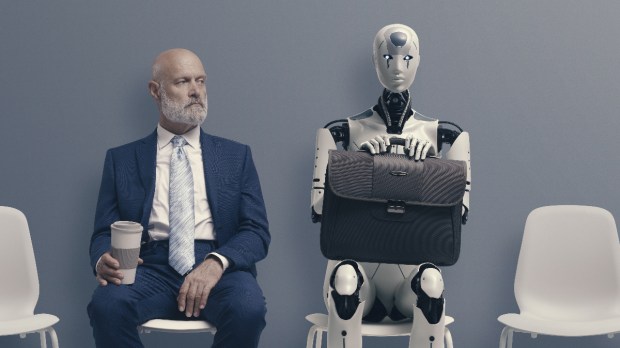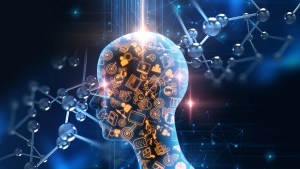Artificial intelligence is the talk of the town these days, and generally not in a good way.
Headlines like “Students use AI to cheat on exams,” “The Double-edged Sword of Artificial Intelligence,” “Artificial intelligence leads to new kinds of deception,” and “Should I Be Scared of Artificial Intelligence?” don’t exactly inspire confidence.
Sifting through all the fearmongering, you might wonder whether you actually need to be concerned. And if there is a concern about AI, what is it, exactly?
Staying human in the AI era
A new book, Staying Human In an Era of Artificial Intelligence by Joseph Vukov, grapples with questions arising from new forms of artificial intelligence and explains them from a reasonable, Christian perspective. We reached out to the author to learn more about the good and bad sides of this rising technology.
Vukov is an Associate Professor in the Philosophy Department at Loyola University Chicago, Associate Director of the Hank Center for the Catholic Intellectual Heritage at Loyola, and an Affiliate Faculty Member in Catholic Studies and Psychology. Nationally, he also serves as the Vice President of Philosophers in Jesuit Education.
It’s important to be informed and aware about what’s coming in the world of AI, Vukov said in an interview with Aleteia.
“Right now, we are living in the Wild West days of AI development,” he said. “A lot of the applications are really nothing more than ‘neat tricks.’ But give it a decade or two, and my suspicion is that we will see AI integrated into our daily lives in ways that we can’t even imagine now. If we are to face those decades, we need to go into them with our eyes wide open.”
The real concerns with the rise of AI
One of the spookiest doomsday prospects in the news is the idea of AI achieving consciousness, a sort of Ex Machina-scenario. Is something like that a real concern?
“I’m not particularly concerned about AI achieving consciousness. The Catholic tradition actually has the resources for explaining why this shouldn’t be a big concern,” Vukov said. “Humans are, the Catechism tells us, not only souls, but souls and bodies together. And pretty obviously, an AI is not embodied in the way humans are embodied. So any kind of consciousness or intelligence an AI achieves, by definition, won’t be comparable to human consciousness or intelligence.”
If not consciousness, what are the actual concerns about the growth of this technology?
“This shouldn’t imply that we have nothing to worry about,” Vukov said. “Most of the major concerns I have about it are honestly less flashy concerns.”
One concern is how AI models are built—”or to use the technical term, trained”—and how transparent companies are about that training. Another is the proliferation of AI content that is very hard to detect as AI-generated.
“I work in a university, so my colleagues are consistently concerned about the near impossibility of detecting AI-generated essays,” he said.
Human or AI?
While this is a real concern, it’s only the tip of the iceberg.
“Think about the implications for political discourse, social media, the military customer service, health care, and education. AI is being deployed—or will be deployed soon—in all these areas,” he said.
Not being able to tell the difference between AI-generated content and human-generated content will affect each of these areas. “What happens when we don’t know if there is a human or AI behind an avatar, and it is near impossible to tell the difference?”
A final concern about the rise of AI? “The temptation all of us will have to use it more than is healthy,” Vukov candidly stated. “Is there anything wrong with using ChatGPT to help with some work? I don’t think so. But the more I lean on it, the less I bring my humanity to my everyday tasks. Like all technologies, AI has the capacity to help us, but also to diminish our humanity. And I worry that, just a few years from now, we’ll have found ourselves collectively and non-reflectively having taken the latter option.”
The good news about AI
These concerns are real, but they are balanced with promising and positive uses of the rising AI technology too.
“Pope Francis has pointed out that AI can be helpful for eliminating ‘drudgery’ from certain kinds of work and for working with data,” Vukov said.
Because AI can identify patterns in data that are very difficult for humans to notice, these technologies can lighten the workload considerably. “Everyone working in 21st-century life can identify areas of their working day that count as ‘drudgery,’” he said. “If AI can help eliminate some of these tasks from our work lives so we can focus on more meaningful tasks, that’s a good thing.”
The key to AI success
Vukov gave a key to understanding how to use AI well: “AI is most promising and effective when used by people who are already experts in the relevant domain.”
He compared AI to a thesaurus, a tool that makes an expert writer better, but an amateur worse. “AI will be tremendously helpful for writing code, if you already know how to code. It will help facilitate better medical care, if used by expert medical professionals,” and so on, he said.
AI has the potential to be tremendously helpful, but not in the way we might think. “It isn’t that we can swap AI for real human expertise. Instead, you need the human expertise to use AI effectively,” he said.
Vukov’s expert opinion is a refreshing contrast to much of the AI narrative. While there are real concerns, the good points to this rising technology are considerable.
We can have hope that with some common-sense guidelines, AI will make experts even better at their work and will eliminate drudgery, freeing up workers’ time for more humane and enjoyable pursuits.



